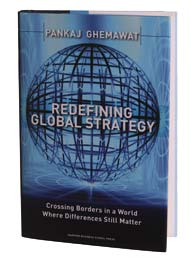I recently finished reading Redefining Global Strategies: Crossing Borders in a World Where Differences Still Matter by Pankaj Ghemawat.

This book provides a strong counterpoint to Tom Friedman’s The World is Flat.
While The World is Flat may leave an executive thinking We have to be in Brazil and Russia and China and India yesterday! Pankaj emphasizes a more measured, sober approach to expanding globally. He also makes a good case for looking beyond the BRIC countries.
Pankaj argues that there are very few truly global companies. Most companies are going through a phase of semiglobalization in which “levels of cross-border integration are generally increasing and, in many instances, setting new records, but fall far short of complete integration and will continue to do so for decades.”
Pankaj says that companies should ask themselves if they should even go global to begin with. At a minimum, he recommends that companies apply his “CAGE distance framework.” CAGE refers to the four types of distance that companies must overcome to succeed in a new market: Cultural, Administrative, Geographic, and Economic.
This is a dense book and it feels academic at times. But don’t let that stop you from reading it. It is an important book and could help many executives avoid a lot of headaches as they invest millions and millions in, say, Brazil or Russia or India or China.
Here is a blurb from a New York Times review:
Very few companies are globally global, Mr. Ghemawat observes. Even Toyota became No. 1 in autos by linking operations within the Americas, within Europe and within Asia, rather than across them. Definitions of region can vary — not just continents but trans-Atlantic, Greater China, trans-Indian Ocean, Eurasia — and Mr. Ghemawat examines a variety of regional hub strategies. But the latter, too, is no strategic panacea: regional platforms can grow into regional fiefdoms.
“Nobody has figured out the optimal way to organize a complex global economy,” he concludes. That is because no single optimal strategy exists. Companies are left to pursue what Mr. Ghemawat labels A.A.A: — adaptation, aggregation, and arbitrage — or, in straightforward English, multiple variants of individual tailoring.
